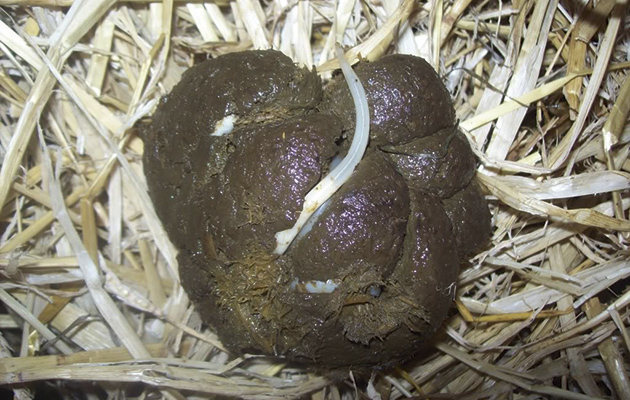Pinworms in horses is a re-emerging condition and all horses are at increased risk of infection — that was the message conveyed by Edd Knowles when speaking at the British Equine Veterinary Association (BEVA)’s congress in September.
Previous veterinary thinking was that Oxyuris equi — more commonly known as pinworm — affected only a limited age range of young horses, it caused mild clinical signs and was easy to control with a routine worming programme.
However, recent reports suggest this is not the case.
“Anthelmintic [wormer] resistance is emerging,” said Mr Knowles. “Many reports involve mature adult horses that have received apparently appropriate recent anthelmintic treatment.”
What are pinworms in horses?
Adult pinworms are white and up to 15cm in length, and primarily live in a horse’s right dorsal colon.
Female pinworms lay yellow eggs around the horse’s anus — often leading to perianal pruritus (itching of the tail) — and then die, leading to the worm being passed in droppings. Dislodged pinworm eggs become infectious within three to five days.
Besides tail itching, pinworm has also been linked to colic, with some horses suffering from loss of appetite and general depression. In horses living in herds, however, only one or two may show signs of infestation. This makes it is easy for pinworm to go unnoticed (vet, 29 October). The worm can sometimes be seen protruding from the horse’s anus before re-entering the gut shortly afterwards.
How to treat pinworm in horses
Signs of a pinworm infestation have been reported to persist after initial treatment with an ivermectin or moxidectin wormer.
“The continued presence or rapid reappearance of eggs despite repeated treatment was found in mature horses in Germany. Egg shedding ceased only after mebendazole treatment,” Mr Knowles added.
“In the US and New Zealand, adult pinworms that had survived treatment with ivermectin or abamectin were killed only by pyrantel or oxfendazole.”
Always consult your vet for advice when pinworm is suspected.
“I currently use three doses of pyrantel embonate or mebendazole at two- to three-week intervals in persistent, severely affected cases,” Mr Knowles told H&H.
Ref: H&H 5 November, 2015




